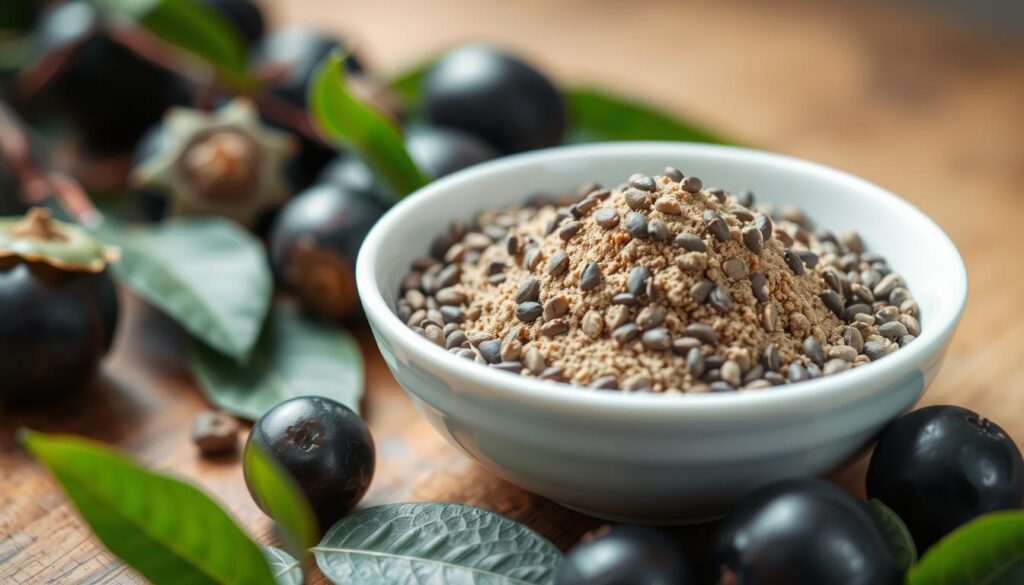Have you ever thought about how small things can have a big impact? Like the kind words that make someone’s day or the tiny seeds that are packed with health benefits. Sabja seeds, or basil seeds, are one such example of these tiny wonders.
Picture yourself walking through a busy Indian market, surrounded by the smells of fresh spices and herbs. You come across a vendor selling sabja seeds and feel curious. These small seeds might seem insignificant, but they’re actually a treasure in traditional medicine, used in Ayurvedic and Chinese healing.
These seeds are amazing because they’re so small but can make a big difference in your health. They’re great for people who want to lose weight or need help with digestion. Adding sabja seeds to your meals not only boosts your health but also connects you to ancient traditions of taking care of yourself.
Key Takeaways
- Sabja seeds are a rich source of dietary fiber essential for digestion and reducing bloating.
- These seeds support weight management by promoting a feeling of fullness.
- Sabja seeds can help in hydration due to their ability to absorb water and form a gel-like substance.
- They have cooling properties, making them ideal for consumption in hot weather.
- Known for their nutritional benefits, sabja seeds can be easily integrated into various recipes.
What Are Sabja Seeds?
Sabja seeds come from the sweet basil plant. They are a big part of Indian and Southeast Asian food and medicine for centuries. These small seeds are getting popular all over the world because of their health benefits and unique look.
Origin and Description
Sabja seeds come from the sweet basil plant, known as Ocimum basilicum. They look like sesame seeds but are black. For a long time, they’ve been used in traditional dishes and remedies in India and Southeast Asia.
Other Names and Varieties
Worldwide, sabja seeds are known by different names. In English, they’re called basil seeds, but in India, they’re sabja seeds in Hindi or tukmaria seeds. There are many types of sabja seeds, each with its own benefits and uses. This makes them useful in various recipes and remedies around the world.
How They’re Used Globally
Sabja seeds have many uses worldwide. In India, they’re a key ingredient in drinks like falooda and refreshing beverages. They’re also used in smoothies, yogurt parfaits, and as a supplement. Their ability to swell and thicken drinks makes them great for recipes. Plus, they’re good for health, so people add them to their diets and wellness routines.
| Nutrient | Amount per 100 grams of basil seeds |
|---|---|
| Protein | 14.8 grams |
| Lipids | 13.8 grams |
| Carbohydrates | 63.8 grams |
| Fiber | 22.6 grams |
| Calcium | 154 mg |
| Iron | 3.17 mg |
| Potassium | 462 mg |
| Vitamin A | 5275 IU |
| Vitamin C | 18.0 mg |
Nutrition Facts of Sabja Seeds
Learning about sabja seed nutrition is key for adding this superfood to your meals. These small seeds are full of important nutrients. They offer a mix of macronutrients, vitamins, and minerals.
Macronutrient Breakdown
Sabja seeds are a great source of nutrients, balancing carbs, proteins, and fats. A 28-gram serving of sabja seeds has:
| Nutrient | Amount per 28g |
|---|---|
| Calories | 60 |
| Carbohydrates | 63.8 g |
| Protein | 14.8 g |
| Lipids | 13.8 g |
| Fiber | 22.6 g |
They are made up of 42% carbs, 20% proteins, and 25% healthy fats. The protein in sabja seeds is high, making them great for vegetarians and vegans.
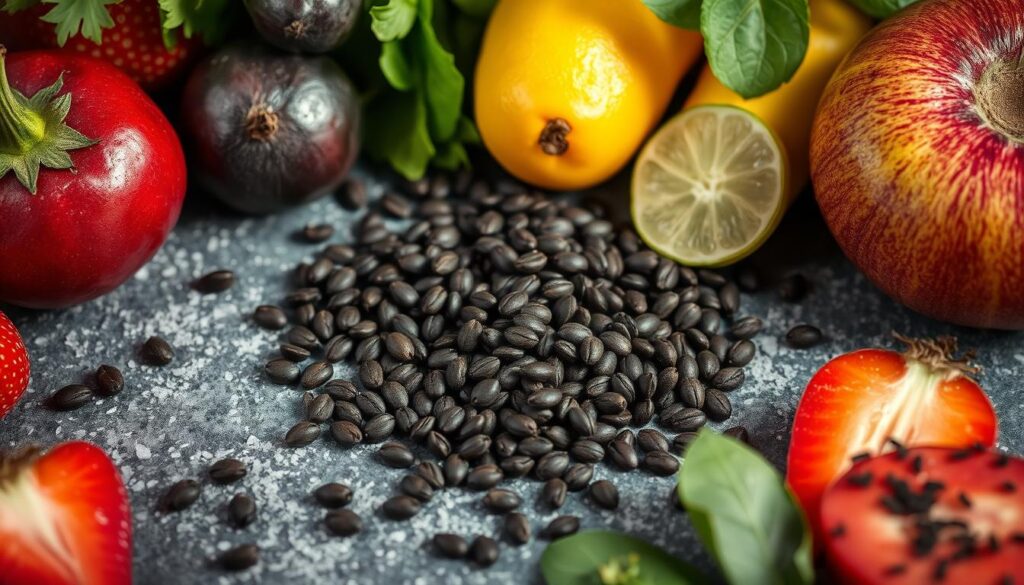
Vitamin and Mineral Content
The sabja seeds vitamin and mineral content is impressive. They offer essential minerals for good health:
| Mineral | Amount per 28g |
|---|---|
| Calcium | 15% of Daily Recommended Intake |
| Iron | 10% of Daily Recommended Intake |
| Magnesium | 10% of Daily Recommended Intake |
| Zinc | 1.58 mg |
They also have a lot of omega-3 fatty acids. About 9358 mg per serving supports heart health and brain function.
Caloric Information
Calories in sabja seeds are low, making them ideal for weight management. A tablespoon (13 grams) has only 42 calories. This makes it easy to add them to your meals without gaining weight.
Adding sabja seeds to your diet brings many health benefits. Their strong nutritional profile supports overall well-being.
Health Benefits of Sabja Seeds
Sabja seeds, also known as basil seeds, are packed with health benefits. They are great for digestion, weight management, and staying hydrated.
Aids Digestion
Basil seeds health benefits include helping with digestion. They are full of fiber, more than a whole bulb of lettuce or spinach. This fiber helps with smooth bowel movements.
It makes them perfect for people with stomach issues. Sabja seeds can help with constipation and bloating by making bowel movements regular.
Weight Management
Sabja seeds are great for weight loss because they are low in calories and high in fiber. They have only 27 calories per 100 grams. Adding them to your diet can help you feel full and support weight loss.
The fiber in sabja seeds also helps control hunger and appetite. They are full of nutrients like Omega-3 fatty acids. These acids can lower the risk of heart problems and other chronic conditions.
Hydration and Cooling Effects
The hydrating properties of sabja seeds are great for hot weather. They can absorb water and form a gel-like substance. This helps keep your body hydrated.
Drinking sabja seeds can also cool your body down. They are a popular ingredient in drinks and beverages in the summer. Regularly eating them can prevent heat-related problems.
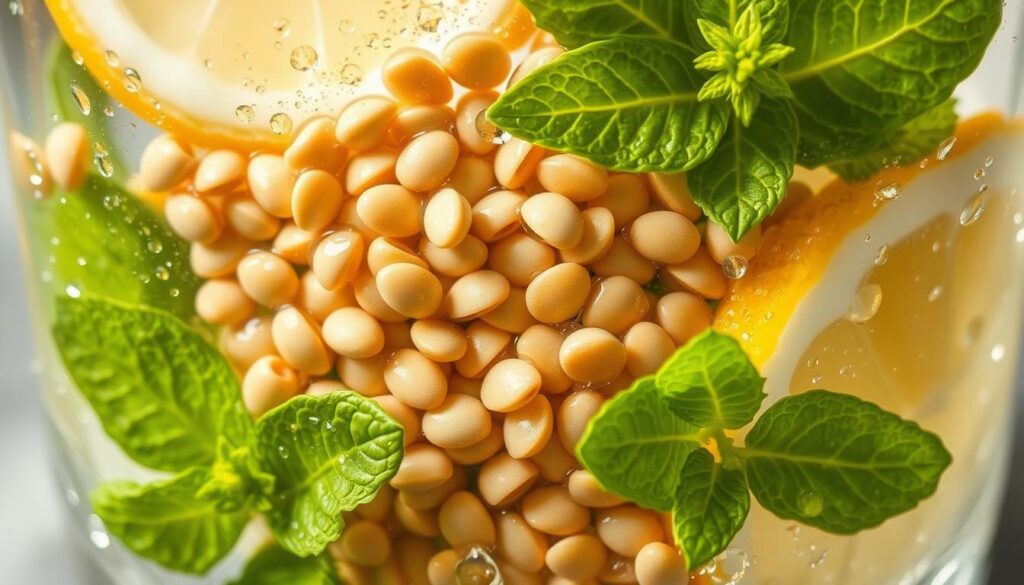
| Nutrient | Amount per 100g |
|---|---|
| Calories | 27 |
| Protein | 2.54g |
| Dietary fiber | 3.9g |
| Calcium | 154mg |
| Iron | 3.17mg |
| Potassium | 462mg |
In conclusion, basil seeds health benefits are many. They help with digestion, weight loss, and staying hydrated. Adding these seeds to your diet can greatly improve your health.
Sabja Seeds and Digestion
Sabja seeds are known for their health benefits, especially for digestion. They are full of dietary fiber. This makes them a great way to keep your digestive system healthy.
Fiber Content and Benefits
Sabja seeds are packed with fiber. Just one tablespoon gives you about 5 grams. This fiber is key for a healthy gut. It helps keep your bowel movements regular and stops constipation.
It also acts as a prebiotic. This supports the good bacteria in your gut. This is great for your overall digestive health.
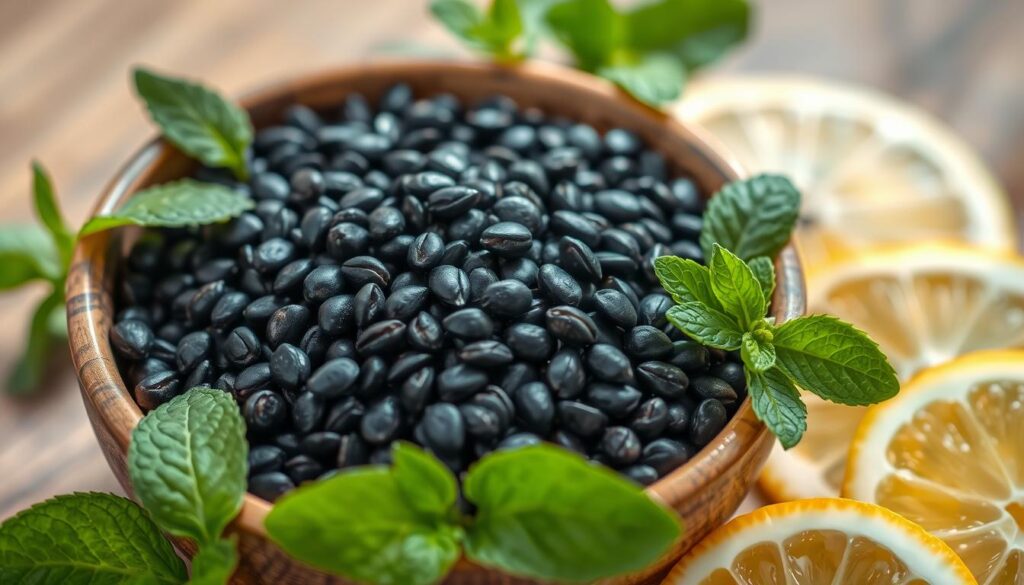
How It Helps with Bloating
When soaked in water, sabja seeds become gel-like. This can help reduce bloating. The gel helps regulate bowel movements and eases discomfort.
This shows how important sabja seeds are for digestion. They help prevent bloating and gas. Adding them to your diet can make your gut healthier.
Sabja Seeds in Weight Loss
Sabja seeds are known for their health benefits, especially in weight loss. They help control appetite and regulate blood sugar levels. This makes them great for those trying to manage their weight healthily.
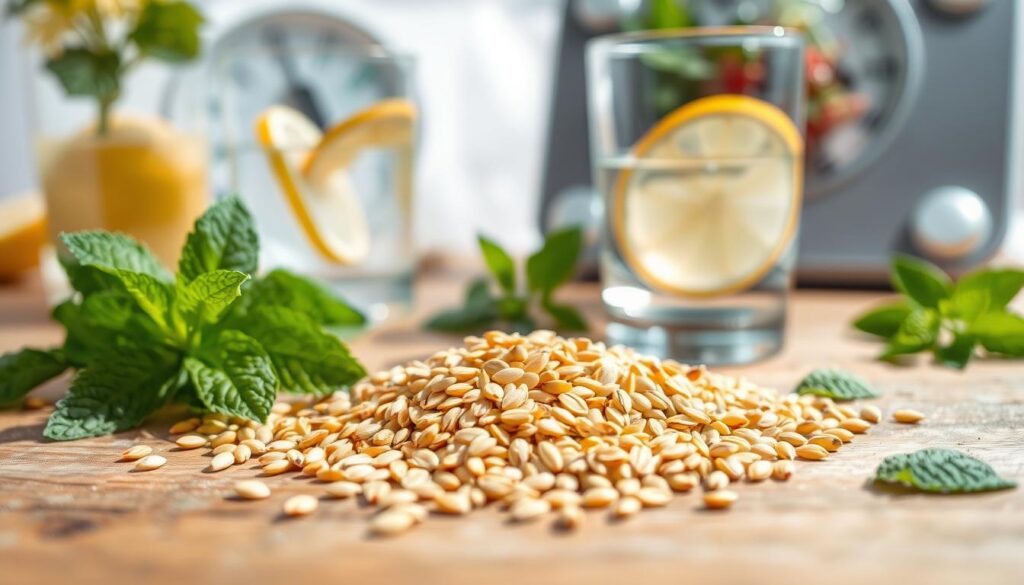
Appetite Control Methods
Sabja seeds help with weight loss by making you feel full. They are high in fiber, which expands in water, making you feel satisfied. Just 4 grams of these seeds have more fiber than a whole bulb of lettuce or spinach.
This fiber content helps control cravings and stops overeating. Sabja seeds are also very low in calories. Two teaspoons of them in water have only 40 calories, making them a great snack without adding extra calories.
They also have 20% protein per 100 grams, which is important for muscle health and feeling full. This protein is a natural vegetarian source.
Blood Sugar Regulation
Sabja seeds also help control blood sugar levels, which is key for weight loss. Their high fiber slows down the conversion of carbs into glucose. This leads to more stable blood sugar levels.
This stability prevents the spikes and crashes that can make you hungry and eat too much. Studies show that sabja seeds’ fiber and Omega-3 fatty acids are good for blood sugar levels, especially for people with diabetes.
| Nutrient | Sabja Seeds (per 100g) | Chia Seeds (per 100g) |
|---|---|---|
| Calories | 27 | 137 |
| Protein | 2.54g | 4.4g |
| Total Fat | 0.61g | 8.6g |
| Dietary Fiber | 3.9g | 10.6g |
| Omega-3 Fatty Acids | Moderate | High |
| Water Absorption | Up to 15x weight | Up to 10x weight |
Adding sabja seeds to your diet can help with appetite control and stable blood sugar levels. These benefits support a healthy weight loss journey.
Using Sabja Seeds in Recipes
Adding sabja seeds to your meals is easy. These tiny seeds, known as sweet basil seeds, are packed with nutrients. They’re great for many dishes and drinks. Let’s look at the best ways to use them in drinks, breakfast, and main dishes.
Drinks and Beverages
Sabja seeds are versatile and boost the nutrition of many drinks. They’re a key ingredient in *falooda*, a beloved Indian dessert drink. Adding them to lemonade or coconut water lemonade makes the drinks more hydrating and nutritious. For a new twist, mix sabja seeds into your favorite smoothie. This turns a regular drink into a gluten-free superfood.
Breakfast Ideas
Begin your day with a nutritious breakfast by adding sabja seeds. Stir them into oatmeal or yogurt for extra fiber and texture. Or, sprinkle them on top of smoothie bowls with fruits and nuts for a filling breakfast. Sabja seeds are versatile in breakfast dishes, making them a great way to boost your morning nutrition.
Incorporating into Main Dishes
Main dishes can also benefit from sabja seeds. Use them as a thickener in soups and stews or add crunch to salads. Soaked in water, they form a gel-like consistency, perfect for binding ingredients in gluten-free recipes. Adding them to desserts like panna cotta can also enhance their nutritional value, aiding digestion and providing essential nutrients.
| Nutrient | Content per Serving |
|---|---|
| Calories | 29 |
| Fat | 2g |
| Carbohydrates | 3g |
| Fiber | 2g |
Sabja seeds have many uses in cooking, fitting into almost any diet. Whether you’re making smoothies, breakfasts, or main dishes, their nutritional benefits and versatility make them a great addition to your kitchen.
Side Effects and Precautions
Sabja seeds are packed with nutrients and offer many benefits. But, it’s important to know about the side effects and precautions. Some people may have adverse reactions to them.
Potential Allergies
An allergic reaction to basil seeds is something to watch out for. Symptoms can include itching, swelling, dizziness, and trouble breathing. Eating too many sabja seeds can cause stomach issues like bloating, cramps, and diarrhea because they are high in fiber. It’s key to stick to the recommended amount to avoid these problems.
Medication Interactions
It’s important to know about sabja seeds medication interactions before adding them to your diet. People taking blood thinners should be careful because sabja seeds are high in Vitamin K. This could affect how well blood thinners work. Also, those with diabetes should talk to their doctor because sabja seeds might change blood sugar levels.
Safety During Pregnancy
For sabja seeds during pregnancy, it’s best to be careful. There’s not enough research on how safe they are during pregnancy. Pregnant women should talk to their doctor before eating sabja seeds. The seeds are high in fiber and can make you feel very full, which might affect your nutrition. Plus, there’s a chance of allergic reactions. Pregnant women should make sure their diet supports their health and their baby’s growth.
Sabja Seeds vs. Chia Seeds
Knowing the differences between sabja seeds and chia seeds can help you make better food choices. Both seeds are full of fiber and can turn into a gel when soaked. But, they have different nutritional values and uses. Let’s look at these differences for a full comparison.
Nutritional Comparison
Looking at sabja seeds and chia seeds, both are packed with nutrients but in unique ways. Chia seeds have 58 kcal per 100 grams. Sabja seeds have about 57 kcal per tablespoon, or 13 grams.
Chia seeds have 76 mg of calcium and 1 mg of iron per 100 grams. Sabja seeds give you calcium almost 15% of your daily need and iron about 10% per tablespoon. Chia seeds have more omega-3 fatty acids and 3.8 g of fat per 100 grams. Sabja seeds have 2.5 g of fat per tablespoon and 1.240 g of omega-3 fatty acids.
Usage Differences
Chia seeds and sabja seeds can both boost your diet, but they’re used differently. Chia seeds can soak up to 10-12 times their weight in water, creating a gel in 30 minutes to 2 hours. They’re great for smoothies, salads, and breakfast bowls.
Sabja seeds absorb 8-10 times their weight in water and gel faster, usually in 10-15 minutes. They’re perfect for drinks and desserts, especially in Asian cuisine. Their quick gel-forming ability also makes them great for cooling dishes.
Cost and Availability
Sabja seeds are often found in Asian markets and online at a lower price than chia seeds. Chia seeds are more widely available in supermarkets and health food stores worldwide. This wider availability can make chia seeds more expensive, making sabja seeds a cheaper option for those wanting to try them.
In summary, both chia seeds and sabja seeds are great for a healthy diet. Knowing their unique nutritional benefits, uses, and prices can help you choose the best for your needs.
FAQ
What are the health benefits of sabja seeds?
Sabja seeds, also known as basil seeds, are packed with nutrients. They help with digestion, support weight management, and keep you hydrated. They also boost your overall health.
What are sabja seeds and where do they come from?
Sabja seeds come from the sweet basil plant (Ocimum basilicum). They are used in Indian and Southeast Asian cooking and medicine. They look like sesame seeds but are black.
What are some regional names for sabja seeds?
In English, sabja seeds are called basil seeds. They are known as tukmaria in Hindi and ‘sabja gida’ in Kannada. In Tamil, they are ‘sabja vidhai’, and in Gujarati, ‘sabja ni dana’.
How are sabja seeds used globally?
Around the world, sabja seeds are added to drinks like falooda and smoothies. They are also used as supplements in many cuisines for their health benefits.
What is the nutritional profile of sabja seeds?
Sabja seeds are full of nutrients. They have lots of soluble fiber, protein, and essential fats like ALA omega-3 fatty acids. They also have minerals like magnesium, iron, and calcium.
How do sabja seeds aid digestion?
Sabja seeds help with digestion by making bowel movements smoother. They have a lot of soluble fiber and prebiotics. These improve gut health, reduce bloating, and support digestion.
Can sabja seeds help with weight management?
Yes, sabja seeds can help with weight management. They make you feel full because of their high fiber content. This helps control appetite and regulate blood sugar levels, which is important for losing weight.
What are some ways to incorporate sabja seeds into recipes?
You can add sabja seeds to lemonade and falooda, or mix them into oatmeal, smoothies, or yogurts for breakfast. Sprinkle them on salads or use them as a thickener in sauces and soups.
Are there any side effects of consuming sabja seeds?
Sabja seeds are usually safe, but they might cause bloating or allergic reactions in some people. Pregnant and breastfeeding women should talk to a healthcare provider before eating them.
How do sabja seeds compare to chia seeds?
Sabja and chia seeds are similar in many ways, like their high fiber content and ability to form a gel when soaked. But sabja seeds have fewer calories and carbs. They also have more essential minerals like iron and magnesium. They swell and form a gel faster than chia seeds.
